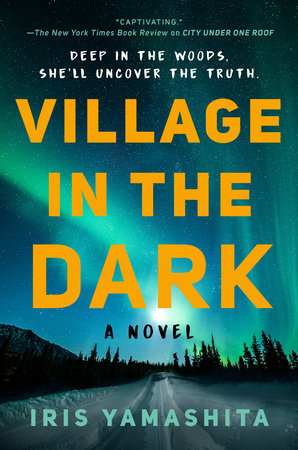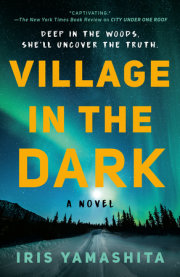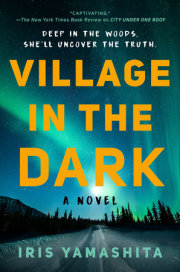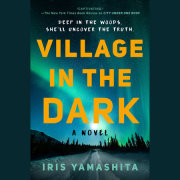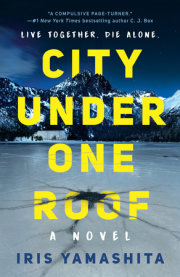Chapter One
Cara
The frigid wind whipped up eager snow eddies off the knolls of the cemetery grounds in South Anchorage. Cara Kennedy tightened her knitted scarf around her neck and wedged her hands in the pockets of her parka in an attempt to keep warm. In summer, the parklike grounds offered a peaceful vista of green, rolling hills under the majestic, white-capped Chugach Mountains. Though the mountains were seven miles east, they were as much a part of the Anchorage skyline as the twenty-two-storied Conoco-Phillips Building on G Street or the twenty-one-floored Hilton Anchorage on Third. Even now in winter, despite having viewed the mountain vista a million times over, Cara still had to marvel at the unobstructed view of the giant, snow-coned peaks under glacier-blue skies. It's why she'd chosen this plot in the Angelus Cemetery for her husband, Aaron, and their son, Dylan.
Yet here she was watching their coffins being unceremoniously craned out of the ground from what were meant to be their final resting places.
Each click of the metal chains hoisting the caskets reverberated through Cara's bones. Aaron's walnut-stained, adult-sized box was raised first, casting a long shadow that blotted the patch of ground in front of her. The reality of what she was doing finally hit her. She felt suddenly queasy, and a wave of anxiety welled up within her. This felt sacrilegious. Was she making a horrible mistake by disturbing the dead?
Over the course of a year and four months, Cara had lost her family and then been placed on long-term disability after failing a psych eval. It seemed like a lifetime ago since she’d been working as a detective for the Anchorage Police Department and Aaron was a manager at the research division of a pharmatech company on the edge of town, while Dylan had sprouted into a precocious six-year-old with an infectious smile.
Admittedly, it wasn't always a bed of roses. Cracks had begun to form in the looking glass of their picture-perfect lives. There was the stress of their jobs, the burdens of taking care of a child, and not least of all, the faithless thoughts that haunted Cara when Aaron slinked into bed in the wee hours after a long day at work. She had even secretly followed him once after a late-night call that he said was a work emergency, but it turned out he actually did go to his office. A getaway to the Talkeetna wilderness two hours north of Anchorage was the self-prescribed medication to fix their relationship. It was on the third morning of their trip that Aaron and Dylan had bundled up in their parkas, gloves, and hats, and headed out to look for snowshoe hares while Cara slept in. They never returned.
There had been searches, of course-helicopters, dogs, and volunteers. But neither her husband nor son could be found . . . until nine months later when lightning started a multi-acre forest blaze and firefighters discovered a skull, a leg bone, a rib cage-everything in pieces at the bottom of a ravine. A man and a boy. Cara asked for a verifying DNA report to be sure. The scattered locations of their remains were explained as the work of wild animals-a suggestion that only added to Cara's pain and horror.
Aaron and Dylan had probably gone off trail and gotten lost, Cara was told. Or maybe Aaron had injured himself on the walk and couldn't make it back, while Dylan had stayed with him. There was only conjecture without any definitive evidence. In Alaska, where two thousand people a year disappear in the beautiful but vast and foreboding wilderness, few of the missing make the news.
Cara fell into a rabbit hole of unanswered questions and a well of guilt. If she had gone with them, could she have prevented them from getting lost, or helped Aaron if he was injured? Could she have found them sooner when there was still a chance to save them? Should she have forbidden Aaron to take Dylan into the cell-signal-devoid wilderness? Aaron's blue, dust-covered SUV, still splattered with the deaths of hundreds of insects, was found abandoned on a seldom-used gravel road with Aaron's expensive SLR camera gear and his driver's license still in the car. Why would Aaron have left his camera and driver's license behind? This last question made her begin to doubt whether the whole thing was an accident at all. Could there have been foul play involved?
At the station, she became obsessed with cases involving body parts and missing persons, including a slew of extremities washing up on the shores of the Pacific Northwest and Canada, and a couple that washed up near Anchorage. The mundane explanations revolved around the buoyancy of modern-day sneakers detaching from decomposed corpses of suicide and drowning victims, not the work of a maniacal serial killer. Still, Cara looked for possible connections to what might have happened to her family and began poking her nose into investigations that were not assigned to her. Colleagues began to avoid her. Cara felt herself breaking apart into irreparable pieces like the remains of her loved ones. Her developing anxiety manifested in claustrophobia and insomnia, and she was put on meds. Even now, she continued to be haunted by disturbing nightmares. After a mandated visit to the psychologist, she was deemed unstable and placed on disability.
Now, watching Dylan’s half-sized coffin being lifted in staccato hoists, Cara had to wonder if she was just heading down another path to Crazy Town. But she had reason, she told herself. It had taken two months to process, but Cara was finally able to get a court order to exhume the bodies. No autopsies had been conducted, since there had been no suspected foul play, but now she wanted a full examination. She knew it would be hard to determine a cause of death from what was left of them, but she also knew that they could still discover evidence of blunt force trauma or bullet holes, or make the distinction between animal teeth marks and cuts by sharp metallic objects.
What had led her to commit this drastic act of exhuming the bodies of her own husband and son? Another case of dismemberment that Cara had investigated on no one's authority but her own. The case had led her to the remote city of Point Mettier-an odd town reached via a claustrophobic tunnel where all of its 205 full-time residents lived in a single, monolithic high-rise condo. In the end, Cara solved the case, a murder that was completely unconnected to the deaths of her loved ones.
Or was it?
Cara had walked away with a clue. It was on the cell phone of a deceased gang member she had never met before named Michael Lovansky: a photo of Aaron, Dylan, and Cara herself on the day they had left home for the Talkeetna wilderness. Why Michael Lovansky had this photo of her family was a tormenting mystery.
In the cemetery a sudden gust of wind picked up, coiling around Cara like a chilling, bodiless snake and making her shiver involuntarily. Was it a protest from the dead? Maybe she would never be able to get the answers she had been looking for. But she also knew that if she didn’t try, she could never put the past behind her to rejoin the land of the living.
Cara was startled by a hand on her shoulder. She turned to find the tall, suited cemetery representative who was overseeing the exhumation. "Would you like to head into the office? I can take over from here. I'll make sure your family is properly handled and documented for the autopsy."
Cara nodded. She was relieved not to have to watch the rest of the process. Instead, she scuttled away from the gaping black holes in the ground and headed toward the beige administrative building near the cemetery entrance where she would plan her next move. She wanted to keep herself busy while she waited for results. She would start with visiting the gang that Michael Lovansky had belonged to.
Almost all the gang members were non-Native, but their leader had inserted himself into Chugach, an outlying Native village not far from Point Mettier, by marrying an elder's daughter. In Chugach Village-a town too small to have its own police force and too remote for Alaska State Troopers to keep an eye on-it would be difficult to extract answers from Lovansky's cohorts. But Cara had to try, and the only way to get to Chugach was to go through Point Mettier.
It was time to take a trip back to the city under one roof.
Chapter Two
Ellie
Ellie Wright puffed lazy smoke rings into the air and patted her red bun wig while considering her poker hand at what she called her weekly "board meeting" at the Salty Pub. She was the owner of the Cozy Condo Inn, really a floor of small apartments in the building that was home to all 205 residents of Point Mettier. There were no guests staying at the Cozy Condo at the moment. Beyond September, few tourists came to visit an ice-boxed city in Alaska with no ski slopes or dogsledding tours, which could only be reached via a one-way tunnel through a mountain.
In high season, people flocked to the pier by the busload, boarding or exiting the cruise ships like gaggles of squawking geese. Motorboats lined up to launch off the slips for fishing or whale watching. Most of the people blew in and out the same day, but a good number of hikers and tree huggers booked overnight rooms. The temporary help who only came for the season also made for good business for Ellie's fourteenth-floor rooms. Ellie charged the tourists an arm and a leg, because, well, why not? But she gave the temporary help-the Summer People, as the kids liked to call them-a discount because they were just there trying to make a living, and their months-long stays didn't include daily maid service. Ellie could take in all of her year's earnings in the four months of high season. Not bad for a woman in her sixties who had grown up in the backwoods of Arkansas on the edge of poverty and had dropped out of high school not knowing diddly from squat.
But now, being February, Point Mettier was a bleak ghost town with temperatures cold enough to freeze a brass monkey. Most of the businesses along the pier were shuttered, except, of course, the Salty Pub, which was a goddamned necessity, and sometimes the petite Chinese lady, Mrs. Lin, kept Star Asian Food open, but most days, Mrs. Lin ran a take-out operation from her unit in the Davidson Condos, or the Dave-Co as it was known.
There were, at present, only eight people in the bar-the four of them playing poker, the tattooed bartender, and the two regular sots who spent most of their days drinking away the ghosts of their past. The eighth was the resident entertainer, Mariko Ishida, who, despite the lack of tourists and customers, was strutting her stuff on the little raised stage. Mariko was in her fifties and thought she was an Asian Madonna or something, shaking her little booty in a sparkly red dress that was looking a bit faded and waving a feather boa around. She wore a Barbarella-styled black wig-one of many in her repertoire. There were no hair salons in the Dave-Co, so it was a matter of practicality. She was singing some jazzy tune in Japanese and the only part that Ellie caught was an occasional "Woo-woo!" Nobody paid her much mind, but Ellie couldn't imagine the bar without her.
Ellie looked down at her cards. Two pair. A queen of hearts, a queen of spades, a pair of threes, and a throwaway. "Raise," she said, adding two chips to the pot.
Ellie knew people found it strange that anyone would want to live in a town that was packed into a single building, but there were some definite advantages to having everything an elevator ride away. It meant you didn't have to bundle up in your parkas, your scarves, your mittens, and your woolly hats, then break your back shoveling a walkway before driving through a goddamned snowstorm to some seedy corner store just to get a pack of ciggies. Ellie could just mosey on down in her housecoat and slippers to Chuck Marino's general store on the first floor. The post office, the police station, and church were also on the ground level. School for the kiddies was through a tunnel. Ellie would take this life over sitting in traffic in a smog-filled hellhole like Los Angeles or New York any day.
"Could you maybe not wave that thing so close to my face?" Chief Sipley asked, referring to Ellie's Marlboro that she kept dipping into the ashtray, before he sourly added "Fold" and put his cards down. There were only two police officers in town, Sipley and his young, pasty-white underling, J.B. Barkowski, who had come from some hinterland in Montana. J.B. was still a newbie, having just arrived a year ago, so he hadn't yet become a trusted member of the inner circle.
Officially, Point Mettier had a mayor, Sam Fossbender, who mostly kept to his office and acted like a building manager, making sure the plumbing worked and things were up to code. But he had been out of town visiting his sick mother in Idaho for a few months now, and nobody had really missed him. As far as Ellie was concerned, the people who really ran the town were all there at the bar, sitting at the table with her playing a round of five-card draw. There was Chief Sipley, of course. A big, burly man. He always put on a jolly face, but deep down, he was a calculating, conniving son of a bitch. Ellie knew she could always count on him to do what was necessary to keep the town safe whether it was legal or not.
Then there was Chuck Marino, the aforementioned owner of the general store. On first glance, Chuck looked like a simple, soft-spoken Black man with a grizzled beard who tended to keep to himself. But Ellie knew that there was much more behind the "quiet man" demeanor. He was, in fact, Dr. Marino, with a PhD in psychology. He was retired from both the army and being a practicing doc, but on Tuesday nights, he still counseled a group of battered women in the church space on the ground floor.
Chuck tossed in his two chips, as did Jim.
Copyright © 2024 by Iris Yamashita. All rights reserved. No part of this excerpt may be reproduced or reprinted without permission in writing from the publisher.

